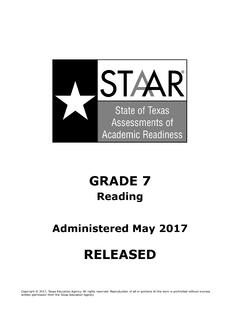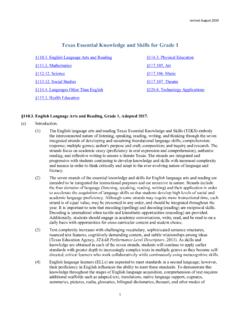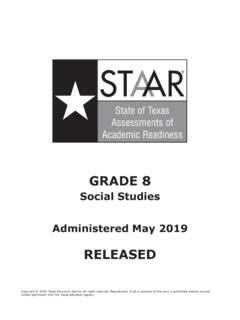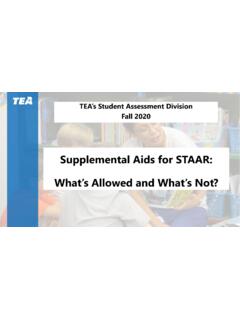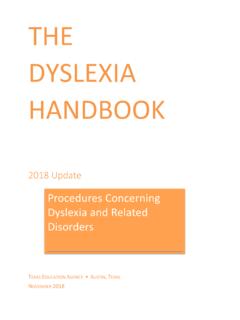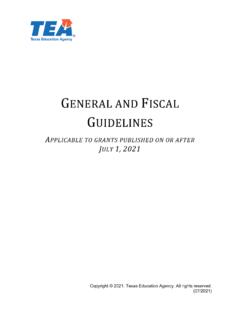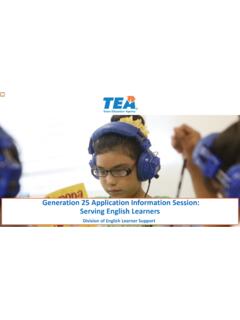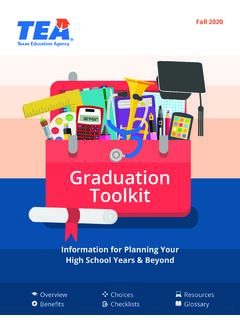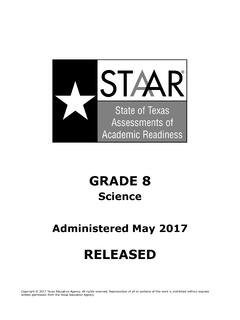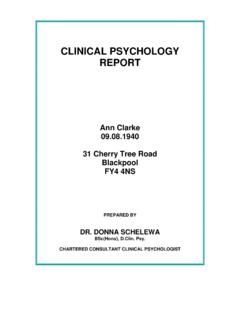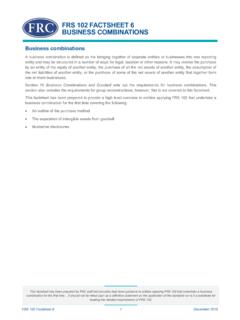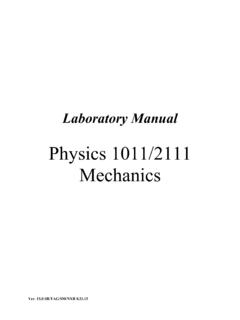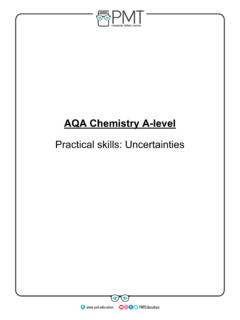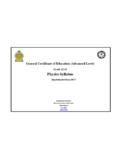Transcription of SCIENCE STANDARDS - Texas Education Agency
1 SCIENCE STANDARDSS tandard SCIENCE teacher manages classroom, field, and laboratory activities to ensure the safety of all students and the ethical care andtreatment of organisms and SCIENCE teacher understands the correct use of tools, materials, equipment, and SCIENCE teacher understands the process of scientific inquiry and its role in SCIENCE SCIENCE teacher has theoretical and practical knowledge about teaching SCIENCE and about how students learn SCIENCE teacher knows the varied and appropriate assessments and assessment practices to monitor SCIENCE SCIENCE teacher understands the history and nature of SCIENCE teacher understands how SCIENCE affects the daily lives of students and how SCIENCE interacts with and influencespersonal and societal SCIENCE teacher knows and understands the SCIENCE content appropriate to teach the statewide
2 Curriculum ( Texas EssentialKnowledge and Skills [TEKS]) in physical SCIENCE teacher knows and understands the SCIENCE content appropriate to teach the statewide curriculum ( Texas EssentialKnowledge and Skills [TEKS]) in life SCIENCE teacher knows and understands the SCIENCE content appropriate to teach the statewide curriculum ( Texas EssentialKnowledge and Skills [TEKS]) in Earth and space SCIENCE teacher knows unifying concepts and processes that are common to all I. The SCIENCE teacher manages classroom, field, and laboratory activities to ensure the safety of all students and the ethical care and treatment of organismsand Knowledge: What Teachers KnowTeachers of Students in Grades 4 8 The beginning teacher knows and safety regulations and guidelines for SCIENCE facilities; safety regulations and guidelines for SCIENCE instruction; procedures for the appropriate storage, handling, use, disposal, care, andmaintenance of chemicals, materials, specimens, and equipment; sources of information about laboratory safety.
3 Procedures for the safe handling and ethical care and treatment of organismsand specimens; procedures for responding to an accident in the laboratory, including first aid; legal issues associated with accidents and injuries that occur in the classroom,field, or laboratory; potential safety hazards in the field ( , insect bites, poisonous plants); the importance of providing laboratory space and equipment for all students,including those with special : What Teachers Can DoTeachers of Students in Grades 4 8 The beginning teacher is able employ safe practices in designing, planning, and implementing allinstructional activities ( , laboratory, field, demonstrations); determine sufficient space and classroom arrangement for carrying outlaboratory activities; provide students with continuous instruction and training in safe techniquesand procedures for all laboratory and field activities, student demonstrations,and independent projects.
4 Read and interpret safety information about chemicals on a Materials SafetyData Sheet (MSDS) and on other chemical labels, including householdproducts; check equipment for safety ( , cracks in glassware, proper grounding ofelectrical equipment) prior to use; create, implement, and enforce rules and safety procedures to promote andmaintain a safe learning environment during laboratory and field activities; implement regular procedures to inventory and maintain appropriate safetyequipment; optimize quick and safe access to all safety equipment ( , eyewash station,sink, safety shower, fire blanket, and extinguisher).
5 Standard II. The SCIENCE teacher understands the correct use of tools, materials, equipment, and Knowledge: What Teachers KnowTeachers of Students in Grades 4 8 The beginning teacher knows and procedures for the storing, securing, and routine maintenance of scientificequipment used in instructional activities; correct and safe operating procedures for scientific equipment used ininstructional activities; concepts of precision, accuracy, and error with regard to reading andrecording numerical data from a scientific instrument; the international system of measurement ( , metric system); the use of grade-appropriate equipment and technology for gathering,analyzing, and reporting data; the use of technology to acquire, assess, analyze, interpret, and : What Teachers Can DoTeachers of Students in Grades 4 8 The beginning teacher is able select and use appropriate tools, technology, materials, and equipment neededfor instructional activities; instruct and monitor students use of materials, tools, and instruments ; make SCIENCE resources accessible to all students; recycle, reuse, and conserve laboratory resources as appropriate.
6 Use the appropriate number of significant figures to record and reportnumerical data; perform unit conversions within the international system of measurement( , metric system); perform conversions within and across measurement systems; use techniques to calibrate measuring devices as appropriate; organize, display, and communicate data in a variety of ways ( , charts,tables, graphs, diagrams, written reports, oral presentations); gather, organize, display, and communicate data using appropriate technology( , Internet, graphing calculators, spreadsheets); evaluate the validity of data and data III. The SCIENCE teacher understands the process of scientific inquiry and its role in SCIENCE Knowledge: What Teachers KnowTeachers of Students in Grades 4 8 The beginning teacher knows and how scientists use different types of investigation, depending on the questionsthey are trying to answer; principles and procedures for designing and conducting an inquiry-basedscientific investigation; the characteristics of various types of scientific investigations ( ,descriptive studies, controlled experiments, comparative data analysis); how current knowledge and theories guide scientific investigations.
7 The use of technology in scientific research; appropriate methods of statistical analysis and measures ( , mean, median,mode, correlation).Application: What Teachers Can DoTeachers of Students in Grades 4 8 The beginning teacher is able design and conduct inquiry-based scientific investigations, includingnonexperimental and experimental designs; plan and implement instruction that provides opportunities for all students toengage in scientific inquiry by using various appropriate combinations of thefollowing processes: ask a scientific question; formulate a testable hypothesis; select appropriate equipment and technology for gathering informationrelated to the hypothesis; make observations and collect data taking accurate and precisemeasurements.
8 Organize, analyze, and evaluate data to find data trends and patterns andmake inferences; and communicate and defend a valid conclusion about the hypothesis underinvestigation; link inquiry investigations to students prior knowledge and experience; focus inquiry-based instruction on questions and issues that are relevant tostudents; use strategies to assist students in identifying, refining, and focusing scientificideas and questions guiding an inquiry activity; guide students in making systematic observations and measurements; use a variety of tools and techniques to access, gather, store, retrieve,organize, and analyze data;Standard III.
9 The SCIENCE teacher understands the process of scientific inquiry and its role in SCIENCE : What Teachers Can DoTeachers of Students in Grades 4 8 (continued) provide opportunities for students to use higher-order thinking skills, logicalreasoning, and scientific problem solving to reach conclusions based onevidence; develop, analyze, and evaluate different explanations for a given scientificresult; identify potential sources of error in a given inquiry-based investigation; develop criteria for assessing student participation in and understanding of theinquiry IV. The SCIENCE teacher has theoretical and practical knowledge about teaching SCIENCE and about how students learn Knowledge: What Teachers KnowTeachers of Students in Grades 4 8 The beginning teacher knows and theories about how students develop scientific understanding; how the developmental characteristics of students influence SCIENCE learning; the statewide curriculum as defined in the Texas Essential Knowledge andSkills (TEKS); methods of planning and implementing an inquiry-based SCIENCE program; how students prior knowledge and attitudes about SCIENCE may affect theirlearning.
10 Common student misconceptions in SCIENCE and effective ways to addressthese misconceptions; how to establish a collaborative scientific community among students thatsupports actively engaged learning; the importance of planning activities that are inclusive and accommodate theneeds of all students; strategies that students with diverse strengths and needs can use to determineword meaning in content-related texts; strategies that students with diverse strengths and needs can use to developcontent-area vocabulary; strategies that students with diverse strengths and needs can use to facilitatecomprehension before, during, and after reading content-related texts; the design and management of learning environments that provide the time,space, and resources needed for learning SCIENCE ;Application: What Teachers Can DoTeachers of Students in Grades 4 8 The beginning teacher is able use lab and fi
